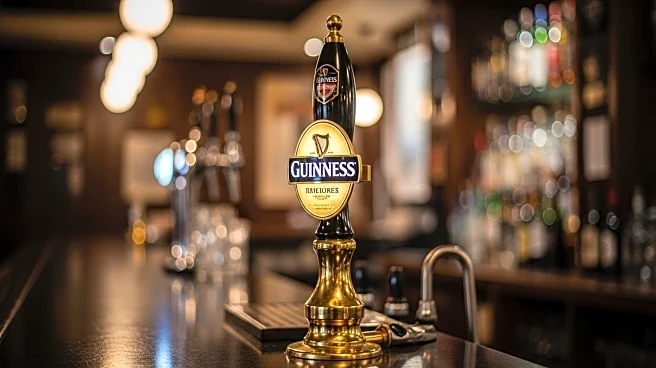What is the story about?
What's Happening?
Netflix's new series 'House of Guinness' has received mixed reviews, with American and British critics praising its stylish depiction of the Guinness brewing dynasty in 1860s Dublin. However, Irish critics have expressed strong disapproval, citing inaccuracies in the portrayal of Ireland's history and culture. The series, which combines elements of 'Succession' and 'Peaky Blinders,' has been criticized for its depiction of post-famine politics and the portrayal of revolutionaries. Despite the show's high audience approval ratings and positive reviews from international critics, Irish reviewers have taken issue with the dialogue, costumes, and lighting, describing the series as lacking authenticity and historical understanding.
Why It's Important?
The criticism from Irish critics highlights the ongoing debate about the representation of historical events and cultural accuracy in media. The backlash against 'House of Guinness' underscores the importance of sensitive and accurate portrayals of national history, particularly in countries with complex colonial pasts like Ireland. This controversy may influence future productions and encourage filmmakers to engage more deeply with local perspectives and historical contexts. The series' reception also reflects broader tensions in the entertainment industry regarding the balance between creative storytelling and historical fidelity.
What's Next?
The negative reception from Irish critics may prompt Netflix and the show's creators to address the concerns raised, potentially leading to revisions or clarifications about the series' fictional nature. The controversy could also spark discussions within the entertainment industry about the importance of cultural sensitivity and historical accuracy in storytelling. As the series continues to gain international attention, it may influence how future productions approach the depiction of historical events and cultural narratives.
Beyond the Headlines
The criticism of 'House of Guinness' raises questions about the ethical responsibilities of filmmakers in representing historical events and cultural identities. The portrayal of Ireland's colonial history and revolutionary movements in the series may contribute to ongoing discussions about national identity and historical memory. The backlash also highlights the potential impact of media representations on public perceptions of history and culture, emphasizing the need for thoughtful and informed storytelling.















